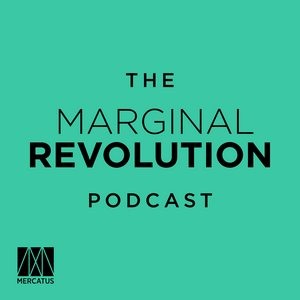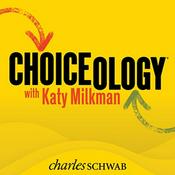The Marginal Revolution Podcast
Mercatus Center at George Mason University

Último episodio
13 episodios
- Can America afford $30 trillion in debt—or is the real question whether it wants to?
In the final episode of Season 2, Alex and Tyler take on the growing mountain of federal debt—now equal to 100% of GDP, with interest payments alone rivaling national defense spending. Alex lays out the case for concern: rising obligations, off-balance-sheet liabilities for Social Security and Medicare, and a political system with no appetite for hard choices. Tyler pushes back, arguing that markets remain calm, real borrowing costs are near zero, and America's wealth-to-debt ratio tells a far less alarming story. From the relevance of the R versus G framework to the lessons of Japan's sovereign wealth strategy, they debate whether the real risk is insolvency or illiquidity, and whether solutions will come through growth, inflation, financial repression, or some mix of all three. Along the way, they explore how AI could reshape the fiscal picture—raising welfare more than wealth, extending lifespans while straining budgets, and changing what kinds of income governments can actually tax.
Transcript: https://www.mercatus.org/marginal-revolution-podcast/americas-debt-crisis-or-calm
Follow Alex, Tyler, and Mercatus
https://x.com/ATabarrok
https://x.com/tylercowen
https://x.com/mercatus
https://marginalrevolution.com/
https://www.mercatus.org/
Timestamps
00:00:00 - Should We Be Worried About the US Debt?
00:08:19 - R vs. G? It's the Political Economy, Stupid
00:16:52 - The Five Ways Out
00:22:21 - AI's Fiscal Paradox
00:30:44 - The Hidden Sovereign Wealth Fund
00:34:56 - The Bottom Line The Return of Tariffs - Unpacking incidence, retaliation, and the return of protectionism
18/11/2025 | 53 minIn this episode, Alex and Tyler tackle the resurgence of tariffs in American policy, a development neither saw coming after decades of trade liberalization. They unpack the economics of who really pays when tariffs jump from 2.4% to 18% in a matter of weeks, exploring everything from tax incidence and exchange rate adjustments to the question of why we treat tariffs so differently from currency depreciation. Along the way, they debate Tyler's new "soft" arguments against tariffs (including contagion effects and rising correlations), examine whether Lerner symmetry still holds in a world of T-bills and exorbitant privilege, and consider the Trumpian case for investment over trade. From soybeans and pharmaceuticals to AI data centers in outer space, they trace how tariff policy affects everything from American landowners to Canadian defense spending.
Tyler arrives ready to confuse and Alex ready to clarify, but by the end they agree on one thing: we've muddled ourselves into something quite bad.
Link to transcript: https://www.mercatus.org/marginal-revolution-podcast/return-tariffs
Follow Alex, Tyler, and Mercatus
https://x.com/ATabarrok
https://x.com/tylercowen
https://x.com/mercatus
https://marginalrevolution.com/
https://www.mercatus.org/
Timestamps
00:00:00 - The return of tariffs
00:02:44 - The threat of contagion
00:04:14 - Who really pays for tariffs
00:16:39 - Exchange rates muddle the picture
00:20:40 - Are tariffs making bad things more correlated?
00:22:53 - Does Lerner Symmetry hold?
00:29:56 - Differences between dollar depreciation and tariffs
00:33:13 - Retaliation
00:34:28 - Tariffs as a Georgist tax on land rents
00:38:10 - How the US economy will adjust
00:49:42 - The bottom line- Why do butchers earn more than bakers even though they're typically less educated? What does Uber driver data reveal about wage gaps? In part three of their series on favorite models, Tyler and Alex explore compensating differentials, Adam Smith's insight that wages adjust for a job's pleasantness, safety, and flexibility. But Tyler pushes back: in a world of increasing returns and clustering talent, are we moving toward winner-take-all dynamics where all good things come together instead of trading off?
Then they turn to Mancur Olson's theory of selective incentives. How do small groups organize to lobby for benefits while big groups struggle? And as markets become more competitive and surveillance more pervasive, are the village chieftains who once solved collective action problems disappearing from economic life, or reemerging in a different form?
Transcript: https://www.mercatus.org/marginal-revolution-podcast/compensating-differentials-and-selective-incentives
Follow Alex, Tyler, and Mercatus
https://x.com/ATabarrok
https://x.com/tylercowen
https://x.com/mercatus
https://marginalrevolution.com/
https://www.mercatus.org/
Timestamps
00:00:35 - Compensating differentials overview
00:04:48 - Segmentation vs. Differentials
00:13:02 - Amenities and the gender pay gap
00:22:07 - Two Competing Theories
00:24:26 - How fixed costs complicate the picture
00:29:02 - There are many margins of adjustment!
00:31:39 - Mancur Olson and selective incentives
00:38:02 - Special interests or bad voters?
00:41:50 - The Waxing and waning of selective incentives
00:48:22 - Alternatives to Selective Incentives - Why are college tuition, healthcare, and car repairs eating up bigger shares of our budgets? Alex says it's all about the Baumol effect, a deep economic insight about relative prices that explains why labor-intensive services inevitably become more expensive over time. Tyler isn't buying it. He thinks the Baumol effect is often invoked as an ex-post explanation but can't make predictions. Further, there's not enough Kelvin Lancaster in Baumol, Tyler argues—not enough attention to bundle of characteristics that define what a good really is.
In this episode, Alex and Tyler debate whether the Baumol effect is profound or overstated. They wrestle with examples ranging from haircuts in India to doggy daycare in Northern Virginia to Soviet-era ballet prices, touching on what poor countries can teach us about service costs and whether we're headed toward a future of AI tutors and robot mechanics. They also explore Staffan Linder's theory of the "harried leisure class"—the idea that as we get richer, we try to squeeze more utility into less time, making even our leisure more goods-intensive and rushed.
Link to transcript: https://www.mercatus.org/marginal-revolution-podcast/baumol-effect
Follow Alex, Tyler, and Mercatus
https://x.com/ATabarrok
https://x.com/tylercowen
https://x.com/mercatus
https://marginalrevolution.com/
https://www.mercatus.org/
Timestamps
00:00 Introduction
00:34 Baumol effect overview
03:28 Critique of Baumol and whether it applies to higher education
09:06 Product quality, Lancastrian bundles, and replacement as repair
15:45 Music industry productivity growth
18:52 Rising healthcare costs: Baumol or improved quality?
22:39 Why haircuts are cheap in India
30:44 The difficulty in predicting productivity gains
34:47 Childcare as a clear example of the Baumol effect
37:26 Are repairs getting cheaper or more expensive?
47:18 The Staffan Linder effect - Alex and Tyler put three classic models through their paces. Alex starts with Spence on how a monopolist chooses quality and applies it to how the New York Times' paywall flipped its audience incentives. Tyler pushes back, arguing that network effects and loyalists matter more than marginal customers. They move to Harberger on tax incidence and the hidden winners and losers of corporate taxes, minimum wages, and congestion pricing. Finally, Solow's growth model frames a conversation on why some countries catch up and others stall, including what it gets right about China, and what it misses. Together, their debate shows why the best models keep earning their place—not because they're perfect, but because they still shape how we think even when they're wrong.
Transcript: https://www.mercatus.org/marginal-revolution-podcast/favorite-models-spence-monopolies-harberger-incidence-solow-growth
Follow Alex, Tyler, and Mercatus
https://x.com/ATabarrok
https://x.com/tylercowen
https://x.com/mercatus
https://marginalrevolution.com/
Timestamps:
00:00 Intro
00:19 Spence's monopoly model
07:08 How Spence applies to NYT and HBO
16:13 Alex and Tyler's approach to writing a textbook
20:43 Harberger's model of who pays tax
24:44 Harberger's model as applied to congestion and minimum wages
33:54 Solow's growth model
42:22 What Solow's model misses
Más podcasts de Ciencias
Podcasts a la moda de Ciencias
Acerca de The Marginal Revolution Podcast
Marginal Revolution has been one of the most influential economics blogs in the world for over two decades thanks to its sharp economic analysis and thought-provoking ideas. Now, co-creators Alex Tabarrok and Tyler Cowen are bringing their nerdy winsomeness to your earbuds. Each episode features Alex and Tyler drawing on their decades of academic expertise to tackle whatever economic idea is currently tickling their noggins.
Sitio web del podcastEscucha The Marginal Revolution Podcast, Palabra Plena, con Gabriel Rolón y muchos más podcasts de todo el mundo con la aplicación de radio.net

Descarga la app gratuita: radio.net
- Añadir radios y podcasts a favoritos
- Transmisión por Wi-Fi y Bluetooth
- Carplay & Android Auto compatible
- Muchas otras funciones de la app
Descarga la app gratuita: radio.net
- Añadir radios y podcasts a favoritos
- Transmisión por Wi-Fi y Bluetooth
- Carplay & Android Auto compatible
- Muchas otras funciones de la app


The Marginal Revolution Podcast
Escanea el código,
Descarga la app,
Escucha.
Descarga la app,
Escucha.


































